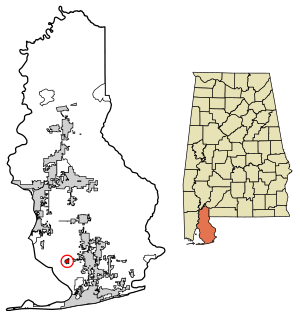Magnolia Springs, Alabama facts for kids
Quick facts for kids
Magnolia Springs, Alabama
|
|
|---|---|
|
Town
|
|

St. Paul's Episcopal Church
|
|

Location of Magnolia Springs in Baldwin County, Alabama.
|
|
| Country | United States |
| State | Alabama |
| County | Baldwin |
| Area | |
| • Total | 0.96 sq mi (2.49 km2) |
| • Land | 0.90 sq mi (2.33 km2) |
| • Water | 0.06 sq mi (0.16 km2) |
| Elevation | 33 ft (10 m) |
| Population
(2020)
|
|
| • Total | 811 |
| • Density | 902.11/sq mi (348.39/km2) |
| Time zone | UTC-6 (Central (CST)) |
| • Summer (DST) | UTC-5 (CDT) |
| ZIP code |
36555
|
| Area code(s) | 251 |
| FIPS code | 01-46072 |
| GNIS feature ID | 122218 |
Magnolia Springs is a small town located in south Baldwin County, Alabama, United States. It is part of the larger Daphne-Fairhope-Foley metropolitan area. The people living here decided to make it an official town in 2006. According to the 2010 census, about 723 people lived in Magnolia Springs. By 2020, the population grew to 811 residents.
Contents
Exploring the History of Magnolia Springs
Magnolia Springs is found at the start of the Magnolia River. This river was once known by different names like River de Lin or Cataract Creek. The community's beginnings go back to the 1700s. At that time, French and British settlers had large farms, called plantations, along the Magnolia River and Weeks Bay.
Early Industries and Life
In the early days, people in Magnolia Springs worked in several important industries. They raised cattle, went fishing, and did masonry work (building with stone or brick). Later, a very big business in the area was making turpentine. Turpentine is a liquid made from pine trees. It was used for many things, like paint and medicine.
During the American Civil War, in 1865, the owners of these turpentine factories burned them down. They did this to stop Union soldiers from taking them over. Boats and steamships were also very important. They brought many travelers and new residents to the area.
Historic Buildings and Town Status
Several buildings in Magnolia Springs are very old and important. They are listed on the National Register of Historic Places. This list includes places like Moore's Grocery and St. Paul's Episcopal Church. These buildings help tell the story of the town's past.
In May 2006, the people of Magnolia Springs voted to become an official town. The vote was 224 in favor and 96 against. The results were confirmed on June 29, 2006. This date is now celebrated as the town's anniversary.
Population and Growth
| Historical population | |||
|---|---|---|---|
| Census | Pop. | %± | |
| 2010 | 723 | — | |
| 2020 | 811 | 12.2% | |
| U.S. Decennial Census 2013 Estimate |
|||
The population of Magnolia Springs has grown since it became a town. In 2010, there were 723 people living there. By 2020, the number of residents increased to 811.
Life in Magnolia Springs Today
After becoming an official town, Magnolia Springs set up its local government. The town council members initially worked without pay. However, in 2008, they decided to give future council members a small salary of $100 per month. The mayor would also receive a salary.
Town Services and Future Plans
The town council moved into new offices in November 2007. For law enforcement, Magnolia Springs works with the Baldwin County Sheriff's Department. This means the sheriff's deputies help keep the town safe.
The town is also thinking about adding more land nearby. This process is called annexation. If it happens, it could make the town much larger and increase its population significantly.
Protecting Natural Resources
The Magnolia River is a very important natural resource for everyone in the area. People who live here care a lot about keeping the river clean and healthy.
River Protection Efforts
As of 2007, people were working to get the Magnolia River named an "Outstanding Alabama Water." This is the highest level of environmental protection the state can give to a body of water. The mayor, Charles Houser, once said that the river is "the lifeblood of the whole community." He explained that the river's health affects everyone, whether they use it for fun or other purposes. If approved, the Magnolia River would be one of only a few rivers in the county with this special protection.
Local Conservation Efforts
Magnolia Springs has also declared itself a bird sanctuary. This means the town works to protect birds and their habitats. The town is also working to improve the park that gave the town its name. These efforts show how much the community values its natural environment.
See also
 In Spanish: Magnolia Springs para niños
In Spanish: Magnolia Springs para niños
 | James B. Knighten |
 | Azellia White |
 | Willa Brown |


